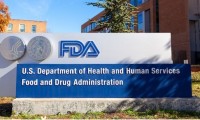-
FDA rejection sets back Regeneron’s plan to defend top-selling eye drug
- Source: drugdu
- 105
- June 30, 2023
-
AbbVie, Genmab’s Epkinly shows promise in follicular lymphoma. Will FDA get on board?
- Source: drugdu
- 109
- June 30, 2023
-
FDA Warms Up to Ipsen’s Post-Hoc Analysis for Rare Disease Drug Ahead of Adcomm
- Source: drugdu
- 108
- June 29, 2023
-
Pfizer’s Litfulo approved by FDA as first treatment for adolescents with severe alopecia areata
- Source: drugdu
- 120
- June 29, 2023
-
Jazz brings the noise to the FDA with lawsuit over approval of Avadel’s narcolepsy drug Lumryz
- Source: drugdu
- 121
- June 28, 2023
-
Intercept restructures as Ocaliva’s NASH hopes dashed again with FDA rejection
- Source: drugdu
- 110
- June 27, 2023
-
Amgen’s supplemental Biologics License Application for Blincyto approved by FDA
- Source: drugdu
- 108
- June 27, 2023
-
After delays, Sarepta’s DMD gene therapy Elevidys finally crosses FDA finish line at $3.2M
- Source: drugdu
- 111
- June 26, 2023
-
FDA orders stores to stop selling Elf Bar disposable Vapes
- Source: drugdu
- 117
- June 26, 2023
-
FDA Approves Sarepta’s Gene Therapy for Duchenne Muscular Dystrophy
- Source: drugdu
- 120
- June 25, 2023
your submission has already been received.
OK
Subscribe
Please enter a valid Email address!
Submit
The most relevant industry news & insight will be sent to you every two weeks.













